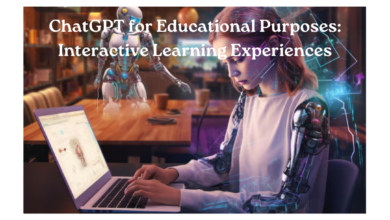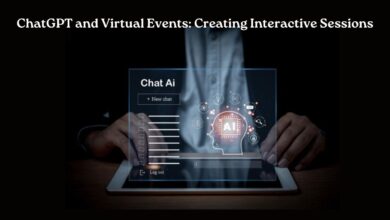Using ChatGPT in Gaming: AI-Powered Game Interactions.

AI integration has revolutionized gaming experiences and expanded game design. One of the most exciting developments in this realm is using conversational AI models like ChatGPT to create dynamic, interactive, and engaging gaming environments. This comprehensive exploration delves into the multifaceted applications, benefits, challenges, and future potential of using ChatGPT in gaming for AI-powered interactions.
1. Introduction to ChatGPT in Gaming
ChatGPT by OpenAI is a state-of-the-art language model that generates human-like text based on the input it receives. When applied in the context of gaming, ChatGPT becomes a versatile tool for facilitating natural and intelligent interactions between players and virtual environments.
2. Benefits of AI-Powered Interactions in Gaming
The integration of ChatGPT into gaming yields several notable benefits. First and foremost, it enhances player immersion by enabling more realistic and dynamic conversations with non-player characters (NPCs). This immersion, in turn, contributes to a deeper emotional connection and engagement with the game world. Additionally, ChatGPT can provide real-time assistance and guidance to players, enhancing their overall experience and enjoyment of the game.
3. ChatGPT for Virtual Non-Player Characters (NPCs)
NPCs are essential to shaping a game’s narrative and gameplay. By leveraging ChatGPT to power NPCs, game developers can create characters that respond intelligently and adaptively to player actions and inquiries. For example, in a role-playing game (RPG), a player might engage in intricate dialogue with an NPC merchant powered by ChatGPT, negotiating prices or gathering quest-related information.
4. Enhancing Player Experience with ChatGPT
The key to a great gaming experience is integrating AI technologies such as ChatGPT seamlessly. Whether it’s generating personalized dialogue options based on player preferences or dynamically adjusting game difficulty based on conversational cues, ChatGPT enhances player immersion and enjoyment.
5. ChatGPT for In-Game Assistance and Guidance
One of the most practical applications of ChatGPT in gaming is providing in-game assistance and guidance to players. For instance, a player stuck on a puzzle can ask for hints or solutions from a ChatGPT-powered assistant within the game, thereby maintaining engagement and reducing frustration.
6. Implementing Conversational AI for Game Quests and Storytelling
ChatGPT can significantly enrich the storytelling aspect of games by dynamically generating dialogue and responses that adapt to player choices and progress. This capability allows for more personalized and interactive narratives, enhancing replayability and player agency.
7. Real-Time Player Support using ChatGPT
Imagine a scenario where players can seek real-time support or troubleshooting within the game environment. Comprehensive assistance is available through ChatGPT, addressing gameplay mechanics and technical issues.
8. ChatGPT for Dynamic Dialogue Generation in Games
Traditional dialogue trees in games can feel rigid and limited. ChatGPT revolutionizes this aspect by enabling fluid and contextually relevant dialogue generation. As a result, players experience more natural and engaging interactions with virtual characters.
9. AI-Driven Personalized Gameplay with ChatGPT
Personalization is a cornerstone of modern gaming experiences. ChatGPT can analyze player behavior and preferences to tailor gameplay elements such as quests, challenges, and character interactions, offering a bespoke experience for each player.
10. Using ChatGPT for Player Behavior Analysis
AI-powered analytics based on ChatGPT interactions can provide valuable insights into player behavior patterns. Game developers can leverage this data to refine game mechanics, improve pacing, and enhance overall player satisfaction.
11. ChatGPT and Game Difficulty Adjustment
Dynamic difficulty adjustment is a game design technique to optimize challenge levels based on player performance. ChatGPT can contribute to this process by interpreting player feedback and adapting game difficulty accordingly, ensuring a balanced and enjoyable experience for all players.
12. Privacy and Ethical Considerations of AI in Gaming
Integrating AI technologies like ChatGPT raises important considerations regarding privacy, data security, and ethical usage. Game developers must prioritize transparency and responsible data-handling practices to uphold player trust and safety.
13. Future Trends: ChatGPT and the Evolution of Gaming
ChatGPT represents just the beginning of AI’s transformative impact on gaming. Future trends may include more sophisticated AI models, augmented reality (AR) integration, and enhanced multiplayer experiences driven by intelligent chatbots.
14. Challenges of Implementing ChatGPT in Game Development
While ChatGPT offers immense potential, integrating it into game development presents technical challenges, such as optimizing performance, managing computational resources, and fine-tuning AI behavior to align with game design objectives.
15. Comparison of ChatGPT with Other AI Models in Gaming
ChatGPT is part of a broader landscape of AI models used in gaming, each with its strengths and limitations. Comparative analysis can inform developers about the optimal use cases for different AI technologies based on specific game design requirements.
16. Training and Fine-Tuning ChatGPT for Gaming Applications
Tailoring ChatGPT to suit gaming applications requires specialized training and fine-tuning. Game developers must curate datasets, fine-tune model parameters, and iterate on implementations to achieve optimal performance and user experience.
17. Potential Applications of ChatGPT in Multiplayer Gaming
The integration of ChatGPT extends beyond single-player experiences to multiplayer environments. ChatGPT-powered chatbots can facilitate communication, moderation, and collaborative gameplay, enhancing social interactions within gaming communities.
18. ChatGPT and the Role of Natural Language Understanding in Games
Natural Language Understanding (NLU) forms the foundation of ChatGPT’s capabilities. Leveraging NLU in games enables advanced dialogue systems, voice commands, and context-aware interactions, fundamentally transforming player interactions and immersion.
19. Case Studies: Successful Integration of ChatGPT in Popular Games
ChatGPT has been integrated into popular games like “AI Dungeon” and “Sea of Thieves”, enhancing player experiences with dynamic and personalized storylines and immersive interactions with virtual characters. These case studies highlight ChatGPT’s potential to revolutionize the gaming industry.
20. User Feedback and Acceptance of AI-Driven Game Interactions
Ultimately, player feedback and acceptance are pivotal to adopting AI-driven game interactions. User-centric design principles, continuous iteration based on feedback, and transparent communication about AI implementations are essential for fostering positive player experiences.
In conclusion, ChatGPT represents a groundbreaking advancement in AI-driven game interactions, offering unprecedented opportunities for innovation and creativity in game development. By harnessing the power of ChatGPT, game developers can create immersive, dynamic, and personalized gaming experiences that redefine the boundaries of storytelling, interactivity, and player engagement in the digital age. As AI technology evolves, gaming’s future promises to be captivating and transformative.
Check www.intogeeks.com for more AI insights on games.




